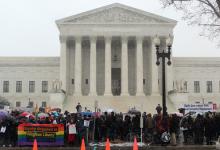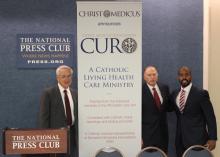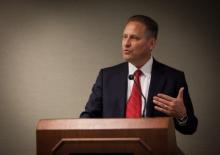Obamacare

One of the most anticipated cases of this Supreme Court season revolves around nuns and birth control.
Zubik v. Burwell, which comes before the justices Wednesday, addresses one of the most contentious parts of the Affordable Care Act: the requirement that employers offer certain types of birth control to their employees — the so-called contraceptive mandate.

Of course Obamacare is failing.
Not quite as badly as No-Obamacare was failing, so I'm still glad it exists. It's a necessary stopgap until we find a system that actually works. But you know what? Single-payer healthcare will fail just as badly.
Yes, I know that single-payer healthcare systems succeed in other developed nations. I also know that competitive insurance-based healthcare systems succeed elsewhere. But neither system will succeed in the United States, because the U.S. is the only nation on earth that refuses to keep healthcare spending from spiraling out of control. If the cost remains the same, it doesn't matter who's paying. In the long run, we all are.

Sixteen months after ruling narrowly that companies with religious objections cannot be forced to pay for employees’ contraceptives, the court faces a chorus of cries from religious charities, schools, and hospitals seeking to get out of the birth control business altogether.
The justices are scheduled to review several petitions Friday asking them to overturn federal appeals court decisions that would force the non-profit groups to opt out of the “contraceptive mandate” included in the Affordable Care Act, rather than receiving the blanket exclusion granted churches and other solely religious institutions.
If they agree to hear one or more of the cases, it will mark the fourth time in five years that President Obama’s prized health care law has come before the high court. And it will put the battle between religious freedom and reproductive rights front-and-center in next year’s presidential race.

THE AFFORDABLE CARE ACT, which has now been the law of the land for five years, is beginning to reshape the national landscape in significant ways.
According to a New York Times analysis of the ACA’s first enrollment period, about 10 million additional people gained insurance in 2014. Many of them fall into demographic groups that have historically struggled to access coverage, such as low-income Americans, people of color, and women. Ultimately, President Obama’s health law is slowly making the country more equal.
There are a few ways the ACA is accomplishing that goal. It has built-in consumer protections to ensure that insurance companies treat people more fairly. It’s created state-level marketplaces to give people new options for purchasing private plans. And it’s expanded the pool of people who are eligible for public coverage through the Medicaid program.
Health policy experts agree that adding more low-income people to the Medicaid rolls represents one of the biggest successes of the ACA so far. According to the Urban Institute, a nonprofit research group, the states that agreed to expand their Medicaid programs—27 so far, plus the District of Columbia—have seen about a 40 percent drop in their uninsured rates.

If you are a Christian who doesn’t smoke, abstains from sex outside your heterosexual marriage and can get your priest to vouch that you go to church at least three times a month, you may qualify for a new Catholic alternative to health insurance.
Taking a cue from evangelicals, a group of traditionalist Catholics on Oct. 2 unveiled a cost-sharing network that they say honors their values and ensures that they are not even indirectly supporting health care services such as abortion that contradict their beliefs.
Christ Medicus Foundation CURO, as the group is called, will be financially integrated with Samaritan Ministries International, which was launched in 1991 by an evangelical home-schooling dad. The SMI network now serves 125,000 people and is exempt from the Affordable Care Act.
“Think about the Gospels and how the Apostles lived,” said CMF CURO director Louis A. Brown Jr. at the program’s Washington, D.C., debut. “They very much shared and cared for each other. And we’re saying: ‘Catholics, you can do that too.’”


The Supreme Court on Monday sided with the evangelical owners of Hobby Lobby Stores Inc., ruling 5-4 that the arts-and-crafts chain does not have to offer insurance for types of birth control that conflict with company owners’ religious beliefs.
Beyond the specifics of the Hobby Lobby case before them, the justices broke new legal ground by affirming that corporations, not just individual Americans or religious non-profits, may claim religious rights.
Does Monday’s decision mean, however, that the religious beliefs of business owners stand paramount? That they are more important than a female employee’s right to choose from the full array of birth control methods she is promised under the Affordable Care Act? Or that a business owner may invoke his religious rights to deny service to a gay couple?
Not necessarily, legal experts say.

Closely held corporations cannot be compelled to pay for contraception coverage, the Supreme Court ruled Monday in its highly anticipated Burwell v. Hobby Lobby Stores case. The "contraceptive mandate" in the federal health care law was challenged under the Religious Freedom Restoration Act, which requires that the government show that a law doesn't "substantially burden" religious exercise.
According to SCOTUSBlog, the Court ruled that the government "has failed to show that the mandate is the least restrictive means of advancing its interest in guaranteeing cost-free access to birth control."
But the decision is applicable only to the contraceptive mandate, and does not apply to other health care mandates.
From Washington Post :
The justices’ 5-4 decision Monday is the first time that the high court has ruled that profit-seeking businesses can hold religious views under federal law. And it means the Obama administration must search for a different way of providing free contraception to women who are covered under objecting companies’ health insurance plans.
Hobby Lobby is an evangelical family-owned chain, and CEO David Green says that the Affordable Care Act infringed upon the family's religious freedom by compelling them to pay for certain contraceptives the family considers to be abortifacients, such as versions of the morning-after pill and IUDs.
Justices Ginsberg, Sotomayor, Breyer, and Kagan dissented.
Read the decision HERE.

Southern Baptists prayed Wednesday that the Supreme Court would rule in favor of the Green family, the evangelical owners of the Hobby Lobby craft chain that challenged the contraception mandate in the Affordable Care Act.
Historians said the prayer from the podium during the SBC’s annual meeting about a pending court decision was noteworthy, though Southern Baptists have preached and issued statements for years on current events.
“I think it’s unusual for it to happen at a convention event,” said Bill Sumners, director of the Southern Baptist Historical Library and Archives.

FOR MORE THAN two centuries, the United States has been the proudest example of democracy in the world. Maybe not the best, but definitely the proudest. Oh sure, we’ve hit some rough patches over the decades, mainly in dealing with our native peoples and other ethnic minorities. Also with women, the poor, the falsely accused, the unemployed, and people who aren’t bankers. But let’s just call those growing pains.
For the most part, America has been that shining city on a hill, and by America, of course, I don’t mean Canada or Mexico, or the other countries whose names I forget, most of which don’t have many good hills to shine from anyway.
But I’m not talking about geography, I’m talking about pride. The pride that comes from being number one in democracy, despite being number 55th in infant mortality and 35th in math. Okay, so we don’t test well. But we’re proud anyway. And we’re still number one in Bible science! [High five!]
But lately, because of continued dysfunction on Capitol Hill, people are starting to whisper that democracy in the United States may have lost some of its shine, like we’re “hiding it under a bushel,” as it says in the old Christian campfire song of my youth. (We also sang “With Jesus in My Boat I Can Ride Out the Current Economic Downturn,” and “Children, Go Where I Text Thee.”)
But if America’s “little light” is no longer shining, at least a few other nations are providing good examples of self-government.
“THE CHURCH radicalized me,” celebrated author and ordained Episcopal deacon Denise Giardina once said, describing how she sees herself as both social activist and servant minister. “The phrase in the prayer book is ‘Interpret the world to the church and the church to the world.’ It’s a totally different way to advocate, with a spiritual point of view.”
This philosophy has shown up in her bestselling novels, published over her long career, such as Storming Heaven (1987) and The Unquiet Earth (1992), which chronicle the history and social impacts of coal mining in Giardina’s native Appalachia; Saints and Villains (1999), which tells the story of Dietrich Bonhoeffer’s resistance against Hitler and the Nazis; and, most recently, Emily’s Ghost (2010), a reimagining of Emily Brontë’s story and how her life was changed by her encounter with an ardent member of the clergy.
Shortly before her recent retirement from teaching creative writing at a West Virginia college, Giardina talked with Jason Howard, author of A Few Honest Words and coauthor of Something’s Rising, about her literary career, social justice activism, and her time in the late 1970s in Washington, D.C., as a member of Sojourners community (the intentional Christian community that founded Sojourners magazine and other ministries).

On one Friday earlier this month, more than 11,000 Muslims in mosques across the country heard a sermon about the Affordable Care Act.
Jewish women’s groups have visited college campuses to get students who think they’re “invincible” to sign up for health insurance.
As the national March 31 deadline for health insurance enrollment looms and with President Obama’s encouragement, organizations across a range of faiths are working to sign up uninsured Americans for coverage under Obamacare.


Conception. Pregnancy. Abortion. Abortifacient.
Those words today are in a rhetorical swamp where contesting religious, medical, and political views muddy understanding. And soon the U.S. Supreme Court will wade in.
On March 25, it will hear challenges to the Affordable Care Act’s provision that employers must provide insurance coverage with no co-pays for contraception.

THIS IS OUR first issue of the new year, and with the new year comes new challenges, new hopes, and new promises which, in order of appearance, you may not live up to, will probably fail to realize, and may never keep. Fortunately, this January issue comes out in early December, several weeks before most self-delusions begin to surface, so there’s still time to change them all, thus saving face. And here in Washington, D.C., saving face is very important. Living up to challenges, not so much. But saving face? We understand.
So let’s get started with turning your future failures into successes and your future frowns into smiles, which are just frowns turned upside down, depending on whether you’re standing on your head at the time.
The point is, you don’t have to make the same mistakes again this year, because we can stop your resolutions before you make them. We can nip failure in the bud, because failure is just eruliaf turned upside down. Or possibly backward. Regardless, following is a short list of things you may have pledged to do this year. Think again.
Lose weight. Right. Sure. Whatever. Not going to happen. So stand up straight and hold your stomach in until your friends walk by. Then breathe. And remember: You’re not too fat. You’re just too short.

This morning at breakfast, I was reading an article in the newspaper about how the Affordable Care Act is negatively affecting some individuals — especially those who buy their own insurance, rather than receiving it through an employer. The article was interesting, but what struck me the most was the way the problem was framed. Rather than approaching the story from a public policy angle, the article mainly focused on the reaction of consumers of health-care goods and services. The crux of the article was whether some individuals should be required to buy a product they might not want or need so that other individuals could have affordable access to health-care products they need desperately but might not be able to afford under the old regime.
The dilemma was presented as a story of tension between healthier consumers and less healthy consumers fighting to get the best deal for their health-care dollars. But could there be another way of thinking about health care, and about our society as a whole? Is there a framework that would allow us to consider these questions in a way that assumed connection, caring, and community between individuals, rather than the zero-sum competition of the market?

The theatrics around the Affordable Care Act seem only to be matched by the public’s ignorance about what it actually is. Case in point: when late-night talk show host Jimmy Kimmel sent a reporter out on the street to ask people their opinions, they felt markedly better about the nuts and bolts of the Affordable Care Act than they did about Obamacare.
Never mind they’re the same thing (sigh).
It seems that a handful of lawmakers have seen to it that our ignorance is sown into full-blown fear, obfuscating the fact that the shutdown – which was largely a fight over the ACA – cost our economy about $25 billion. For those who have been following even on a cursory level, the arguments against the ACA are becoming quite familiar:
· The individual mandate infringes on my freedom not to have insurance.
- The whole thing costs too much.
- It’s a slippery slope to a single-payer system.
On this last point, we can only hope the critics are right, particularly since a single-payer health care system is the only model that has offered hard evidence of both covering everyone and reducing total costs. But since we’re not there yet, let’s consider what we do have with this new law.

This morning a Canadian woman wrote such an interesting comment on an old post of mine, "Rationing is not a four-letter word," that I want to share it with you. I don't know the author, her full name (though she tells me her first name is LaVonne, so she's obviously a great person), or her contact information, so I can't give her full credit. But thanks, LaVonne-in-Canada: I learned a lot from you.
Here's what she wrote about how Canadian health care works for her. I've added a few comments in italics, in case you want to compare the situation of LaVonne-in-Canada with that of LaVonne-in-the-United-States.

After two blockbuster terms in which it saved President Obama’s health care law and advanced the cause of same-sex marriage, the Supreme Court appears poised to tack to the right in its upcoming term on a range of social issues, from abortion and contraception to race and prayer.
The justices, whose term begins Monday, could rule against racial minorities in two cases and abortion rights in one or two others. They also could uphold prayers at government meetings, ease restrictions on wealthy political donors, strike down federal environmental regulations, and take a first bite out of Obamacare.

One of the most depressing things I heard on the first day of the government shutdown was that it was a record fundraising day for both parties. Washington, D.C., is no longer about governing; it is just about winning and losing. But the people who will lose the most during a government shutdown — and then an impending United States government default on paying its debts — are those who live day to day on their wages, those at the lower end of the nation’s economy, and the poorest and most vulnerable who are always hurt the most in a crisis like this. And what happens to those people is the focus of the faith community; that is our job in politics — to talk about what happens to them. Faith leaders have been meeting to discuss what we must do in response to this political crisis brought on by absolute political dysfunction
The government shutdown seems to have gotten the attention of the nation. And if this ends in a default on our debt, the potentially catastrophic crashing of the economy will certainly wake us up. The only positive I see in this crisis is that the right issues — the moral issues — might finally get our attention.